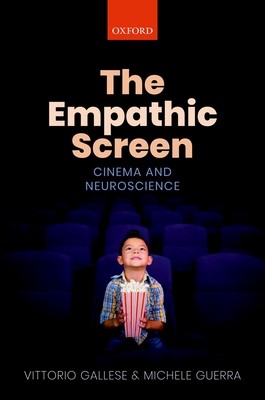
- We will send in 10–14 business days.
- Author: Vittorio Gallese
- Publisher: Oxford University Press, USA
- ISBN-10: 0198793537
- ISBN-13: 9780198793533
- Format: 16 x 23.6 x 2 cm, hardcover
- Language: English
- SAVE -10% with code: EXTRA
Reviews
Description
Why do people go to the movies? What does it mean to watch a movie? To what extent is the perceived fictional nature of movies different from our daily perception of the real world?
We live in a time where the power of images has strongly invaded our everyday life, and we need new instruments and methods to better understand our relationship with the virtual worlds we inhabit every day. Taking cinema as the beginning of our relationship with the world of moving images, and cognitive neuroscience as a paradigm to understand how the images engage us, The Empathic Screen develops a new theory of film experience, exploring our brain-body interaction when engaging with and watching a film. In this book, film theory and neuroscience meet to shed new light on cinema masterpieces, such as The Shining, The Silence of the Lambs, and Toy Story, and explore the great directors from the classical period to the present. Taking a radical new approach to understanding the cinema, the book will be fascinating reading for cognitive scientists, neuroscientists, psychologists, philosophers, and film and media scholars.EXTRA 10 % discount with code: EXTRA
The promotion ends in 17d.00:33:57
The discount code is valid when purchasing from 10 €. Discounts do not stack.
- Author: Vittorio Gallese
- Publisher: Oxford University Press, USA
- ISBN-10: 0198793537
- ISBN-13: 9780198793533
- Format: 16 x 23.6 x 2 cm, hardcover
- Language: English English
Why do people go to the movies? What does it mean to watch a movie? To what extent is the perceived fictional nature of movies different from our daily perception of the real world?
We live in a time where the power of images has strongly invaded our everyday life, and we need new instruments and methods to better understand our relationship with the virtual worlds we inhabit every day. Taking cinema as the beginning of our relationship with the world of moving images, and cognitive neuroscience as a paradigm to understand how the images engage us, The Empathic Screen develops a new theory of film experience, exploring our brain-body interaction when engaging with and watching a film. In this book, film theory and neuroscience meet to shed new light on cinema masterpieces, such as The Shining, The Silence of the Lambs, and Toy Story, and explore the great directors from the classical period to the present. Taking a radical new approach to understanding the cinema, the book will be fascinating reading for cognitive scientists, neuroscientists, psychologists, philosophers, and film and media scholars.

Reviews